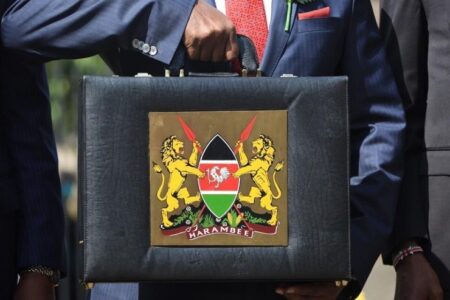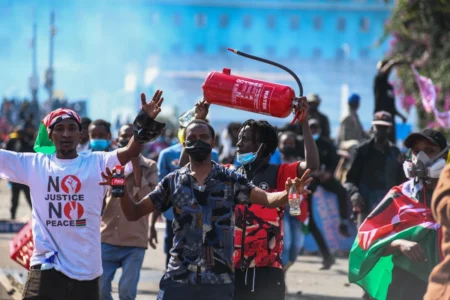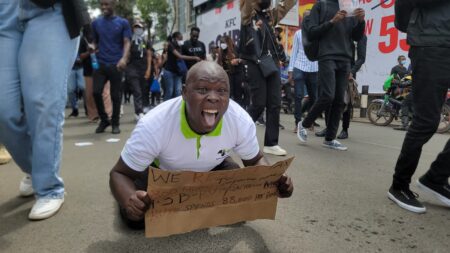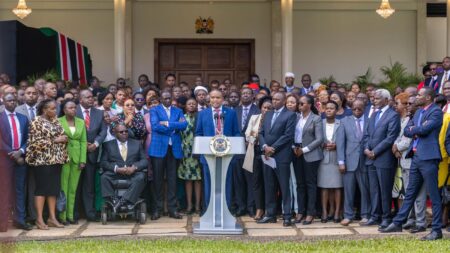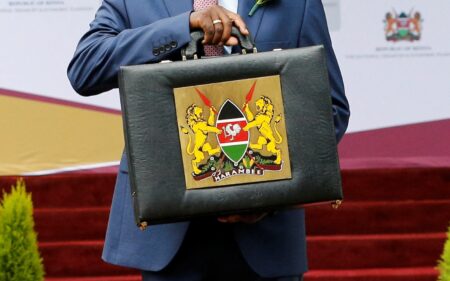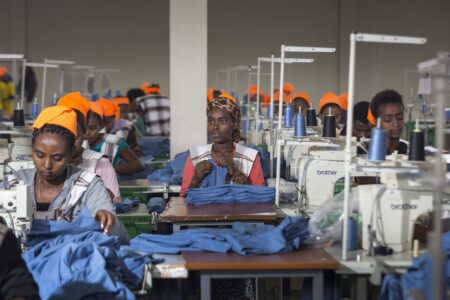- How transition finance can catalyse Africa’s green industrial revolution
- Stanbic PMI Report: Mixed performance as Kenya’s agriculture, construction offset manufacturing decline
- Uganda’s land management gets a tech makeover to boost transparency
- Nigeria’s output dips fastest in 19 months on a sharp rise in costs
- Apple faces growing backlash over Congo exploitation
- Why East Africa is staring at higher wheat prices in 2025
- Nairobi Gate SEZ pumps $7 million into Kenya’s agro-processing industry
- What impact will the US election have on Africa?
Browsing: Finance bill 2024
- Global ratings agency S&P downgrades Kenya from “B” to “B-” on weaker debt trajectory.
- S&P says Kenya’s financial outlook has deteriorated following the rejection of Finance Bill 2024, which was intended to raise tax revenues.
- Agency projects that Kenya’s budget deficit will widen by almost two percentage points, reaching 4.3% for the 2025 fiscal year.
S&P Global Ratings has further downgraded Kenya’s credit score, pushing the East African nation’s rating deeper into junk territory. This downgrade follows the government’s decision to reject controversial tax increases in late June that were aimed at addressing fiscal imbalances.
The latest move by S&P places East Africa’s biggest economy’s rating on par with countries such as Egypt and El Salvador.
The rejection of the 2024/2025 Finance Bill, which was expected to introduce several tax increases, has been a pivotal moment for Kenya’s economic trajectory. The bill included tax hikes on essential items such as …
- Kenya protests led to a steep decline in business activity in July.
- Kenya’s private sector reported backlogs of work build-up and lengthened supplier lead times.
- In the month under focus, however, rates of inflation remain muted.
July 2024 has proven to be a turbulent month for Kenya’s economy, as widespread protests wreaked havoc on the nation’s private sector. The resulting decline in business activity and output has raised concerns about the long-term implications of political instability on Kenya’s economic health.
According to the Stanbic Bank Purchasing Managers’ Index (PMI) survey Kenya protests, which started in June with calls for the rejection of Finance Bill 2024, have triggered a significant downturn in business conditions, posing grim implications for various sectors, and the broader economy.
The PMI Plunge: A stark indicator of economic strain
The Stanbic Bank PMI report for July 2024 offers a sobering snapshot of the state of Kenya’s private …
- Human Rights Watch says that the focus should be on progressive revenue generation and accountability over public funds.
- HRW further recommends strengthening social contract to address the root causes of protester anger.
- Finance Bill 2024, in the context of an IMF program with Kenya, was expected to raise US$2.7 billion in additional revenues in the upcoming fiscal year, in part to meet IMF targets.
IMF programs implementation
The Kenyan government and International Monetary Fund should work together to ensure that the IMF program and its implementation align with human rights, Human Rights Watch said today. The focus should be on progressive revenue generation and accountability over public funds.
Following the recent nationwide protests, President William Ruto declined to sign Finance Bill 2024, which included regressive tax measures that risked undermining rights. Any alternative measures should relieve economic pressures by addressing the root causes of protesters’ anger.
“The widespread …
- The protests, dubbed “occupy parliament,” were coordinated and mobilised on social media in contrast to those led and sponsored by politicians.
- Many were demonstrating for the first time and waved signs such as “Do Not Force the Taxes on Us,” while others chanted: “Ruto must go.”
- Unlike previous political anti-government protests, these demonstrations are not characterised by looting, destruction of property, or stone-throwing.
Social media as a weapon
A bold new generation of young Kenyan protesters has emerged on the streets, forcing the government to back down on several unpopular tax proposals.
What started as anger on TikTok about a controversial finance bill has morphed into a revolt without being organised by political parties.
The government of President William Ruto has managed to do what generations of politicians in the East African nation still need to do unite huge numbers of Kenyans beyond ethnicity and party.
On 18th June 2024, …
- The finance bill aroused many wounds in many Kenyans, leading to protests in the capital city, Nairobi, over the burden of proposed taxes in the finance bill 2024
- Azimio insists that the tax measures will substantially impact both individuals and businesses in the country.
- The National Assembly Committee on Finance, chaired by Molo Mp Kimani Kuria, is expected to table a report on the Bill after carrying out a public participation exercise.
The protests over the Finance Bill
The finance bill aroused many wounds in many Kenyans, leading to protests in the capital city, Nairobi, over the burden of proposed taxes in the finance bill 2024. The protest, dubbed ” Occupy Parliament” demonstrations, aimed to pressure the lawmakers not to pass the bill.
The Finance Bill 2024 has been opposed over some contentious proposals, including a 16 per cent VAT tax on bread, a 2.5 per cent motor vehicle circulation …
- Tax reforms proposed in the bill have aroused concerns due to their potential to increase costs and financial burdens across the board.
- A positive proposal in the Bill for the housing sector is the removal of the excise duty rate on cement clinkers.
- Some of the Finance Bill proposals highlighted reflect the government’s attempts to promote affordability, stimulate construction, and streamline property transactions in the housing sector.
The Finance Bill 2024 has become the focal point of discussions across Kenya, capturing the attention of individuals and businesses alike. This widespread interest stems from the significant and far-reaching impact the proposed bill could have on various sectors and the daily lives of Kenyans.
The comprehensive tax reforms proposed in the bill have aroused concerns due to their potential to increase costs and financial burdens across the board. With the prospect of higher taxes on fuel, motor vehicles, and digital services, many …
-
- Output rises at the sharpest rate in 20 months.
- New order volumes strengthen.
- Input costs fall for the second month in a row.
Kenya recorded an improvement in private sector business conditions during May, as falling cost burdens and rising new business contributed to a solid expansion in activity.
The Latest Stanbic Bank Kenya Purchasing Managers’ Index indicates that activity’s upturn was the sharpest in 20 months, as was input buying growth.
Job creation continued at a mild pace even as reductions in fuel prices and import costs led to a further drop in overall input prices in May, after the first decrease in nearly four years during April.
Selling prices started to rise again, albeit slowly. The Purchasing Managers’ Index (PMI). Readings above 50.0 signal improved business conditions in the previous month, while readings below 50.0 show a deterioration.
The latest headline PMI reading of 51.8 marked the index’s





